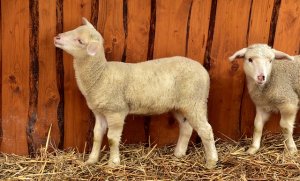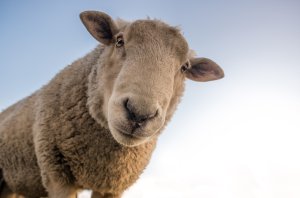Millions of animals are suffering unnecessarily by being slaughtered without stunning to meet religious demands.
That's why we campaign to end religious exemptions to animal welfare laws.
Animal welfare law requires animals to be stunned before slaughter to minimise their pain, suffering and distress. The only exemption is for Jewish and Muslim communities to meet kosher and halal religious dietary preferences.
The scientific consensus is clear that it is more humane to stun an animal prior to slaughter. The slaughter of animals without pre-stunning is permitted in the UK despite a recommendation by the government's own advisory body, the Farm Animal Welfare Council (FAWC), that the practice should be banned. FAWC concluded that animals slaughtered without pre-stunning are likely to experience "very significant pain and distress".
RSPCA, Compassion in World Farming and the British Veterinary Association all support an end to non-stun slaughter to improve animal welfare at the time of death.
- 70% of Brits think stunning animals before slaughtering them is more ethical.
- 72% of the population think food produced from religious non-stun slaughter methods should be clearly labelled.
We support the right to religious freedom. But this is not an absolute right. Religious exemptions shouldn't be made to laws meant to prevent unnecessary animal cruelty.
Take action!
1. Write to your MP
Ask your MP to end the religious exemption that allows animals to be slaughtered without pre-stunning.
2. Share your story
Tell us why you support this campaign, and how you are personally affected by the issue. You can also let us know if you would like assistance with a particular issue.
3. Join the National Secular Society
Become a member of the National Secular Society today! Together, we can separate religion and state for greater freedom and fairness.
Latest updates
Government “committed” to reviewing food labelling, peer says
Posted: Fri, 14 Dec 2018 10:02
The government is "committed" to reviewing food labelling, one of its peers has said, amid criticism of a decision to allow the sale of non-stun halal meat to Saudi Arabia.
During a Lords debate on Wednesday Charlotte Vere said the government was "well aware of public concern around meat slaughtered in accordance with religious beliefs".
She said the government was "committed" to reviewing food labelling "once our future partnership with the EU is clear". She said the government believed it needed "to look at labelling and improve it where we can".
She added: "We believe that if we can give consumers the information they require, they can make an informed choice."
Last year the government told the NSS it was "considering" introducing labelling requirements to show whether meat was from animals which had been stunned before slaughter.
But during the debate Vere also defended a government decision to issue "an export health certificate" which allows meat certified by the Halal Monitoring Committee (HMC) to be sold to Saudi Arabia. HMC does not certify meat which has been stunned before slaughter as halal.
In August the National Secular Society and others criticised a decision to allow the sale of non-stun meat to Saudi Arabia as part of a deal worth £25m. The NSS said the decision would "normalise the mistreatment of animals".
In June The Times reported that the deal meant around 50,000 British lambs a year would be slaughtered and frozen before export. In this week's debate Vere said there was "no contract for 50,000 sheep to go to Saudi Arabia".
Crossbench peer Alexander Trees, who instigated the debate, asked whether the deal was "consistent" with the government's "commitment to maintain animal welfare standards after Brexit".
Trees also highlighted the fact that New Zealand has exported sheep to the Middle East, including to Saudi Arabia, from animals that have been stunned before slaughter and halal certified.
Janet Fookes, the deputy chair of committees and deputy speaker, Liberal Democrat Joan Bakewell, Labour's Jeff Rooker and Conservative Anne McIntosh also questioned the government's plans.
And crossbench peer Indarjit Singh raised the issue of halal food in school meals, asking if the government agreed "that the default position must be the provision of non-halal food".
But Labour's Robert Winston congratulated the government on its "sensitivity to the various religious minorities that carry out their practices in this country".
NSS spokesperson Chris Sloggett said the government "should take steps to reduce the prevalence of non-stun meat sooner rather than later".
"The government could and should repeal the religious exemption to the animal welfare laws.
"Labelling would help to curb the supply of non-stun meat and give consumers more confidence in the meat they buy. A review would be a small step in the right direction, but this must not become an excuse to kick the issue in to the long grass.
"And it is particularly troubling that the government is willing to export meat from animals which have not been stunned before slaughter. Even the inadequate argument we often hear that Jews and Muslims in the UK want non-stun meat is not relevant in this case.
"Veterinary experts are widely in agreement that killing animals without stunning them is inhumane. The government should listen to them."
NSS presses government on non-stun meat as schools row intensifies
Posted: Wed, 21 Nov 2018 15:25
The National Secular Society has called on the government to take action to end the supply of non-stun meat amid growing public opposition to its supply in schools.
The NSS has written to Lord Gardiner, the parliamentary under-secretary for rural affairs, to call for repeal of the religious exemption to the animal welfare laws. The exemption means animals may be killed without stunning for religious reasons.
The NSS also called for a requirement to label non-stun meat while the exemption is in place.
The letter comes after NSS research revealed that at least 17 councils across the UK supply non-stunned halal meat to at least 140 schools.
This week thousands of people have signed a petition to end the supply of non-stun meat to schools in the West Yorkshire district of Kirklees after the NSS's report on the subject. Kirklees Council supplies non-stun meat to at least 40 schools.
The NSS's findings also prompted a report in The Times on Monday which revealed that schools are supplying non-stun halal without telling parents about the origins of the meat.
In the letter to Lord Gardiner NSS chief executive Stephen Evans urged the government "to put a stop to further unnecessary animal cruelty by ending the religious exemption that allows animals to be slaughtered without pre-stunning".
He added that while non-stun slaughter is allowed, the government should ensure "any meat from animals slaughtered without pre-stunning is clearly labelled".
Mr Evans noted that non-stun meat is "routinely being consumed on the general market by unwitting members of the public who are neither Muslim nor Jewish" as a result of the lack of labelling.
The NSS requested a meeting with Lord Gardiner to discuss the issue.
The petition in Kirklees calls on the council to follow the example of Lancashire County Council, which recently voted to uphold its decision to stop supplying non-stun non-poultry meat to schools.
Petition starter Aleksandar Lukic wrote: "Everyone has the right to observe and practice their religion in a free society, but it is clearly unethical for Kirklees Council to serve non-stunned meat to public schoolchildren. Our council has a duty to treat animals in a more humane way."
The petition notes that the council has refused to name the schools affected and that most Muslims are content with pre-stunning.
The consensus among animal welfare experts is that stunning animals before slaughter is more humane than not doing so. Veterinary experts say non-stun slaughter causes "very significant pain and distress" and raises "serious animal welfare concerns".
This week Simon Doherty, president of the British Veterinary Association, told The Times: "All animals should be stunned before slaughter in order to reduce their suffering and improve their welfare. If slaughter without stunning is still to be permitted, any unstunned meat or fish must be clearly labelled to enable consumers to fully understand the choice they are making."
The Farm Animal Welfare Committee, which advises the government, says animals slaughtered without pre-stunning are likely to experience "very significant pain and distress" before they become unconscious.
The EU's scientific panel on animal health and welfare has stated: "Due to the serious animal welfare concerns associated with slaughter without stunning, pre-cut stunning should always be performed."
The Federation of Veterinarians of Europe has called non-stun slaughter "unacceptable under any circumstances".
The RSPCA and Compassion in World Farming also advocate for all animals to be stunned prior to slaughter.
The UK government recently agreed a £25m deal to export non-stunned halal meat to Saudi Arabia, a decision which the NSS said would "normalise the mistreatment of animals".
Meanwhile this week the trade magazine Retail Times noted that the halal brand Humza had tripled its range in Tesco and Morrisons. Humza's website says it applies the "halal principle" that means the animals are "healthy and alive prior to slaughter process".
Humza's meat is certified as halal by a group called the Halal Monitoring Board, which says it does not "work in favour of stunning" and "most" of its outlets are "stun free".
In January the NSS revealed that meat from animals which have not been stunned before slaughter was widespread in UK supermarkets.




